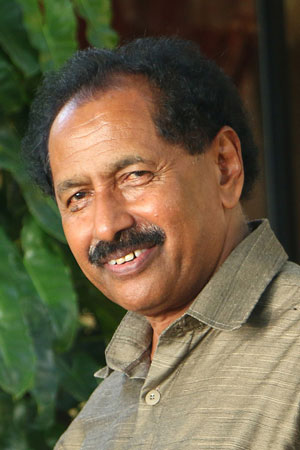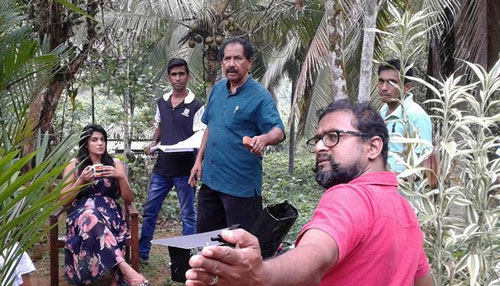“Let Thousand Flowers Blossom”
 In the background of this happiness overflowing within me for being presented with the honorary award this year at the Colombo International Theatre Festival 2019, there are so many things that comes to my mind.
In the background of this happiness overflowing within me for being presented with the honorary award this year at the Colombo International Theatre Festival 2019, there are so many things that comes to my mind.
The first is, seeing from my own eyes how the Colombo International Theatre Festival, a serious, complicated a task with wide spread challenges, which should have been undertaken by the government of a country, is being privately and successfully handled by Inter Act Art Theater Company, a small local organization with tremendous commitment, taking the whole weight and responsibility on their shoulders.
Second, is to see our work which we did on stage enthusiastically and affectionately for a period of time being appreciated at an international festival.
Thirdly, this year 2019 coincides with a very special milestone in my theatrical life. I stepped out on the stage for the very first time with Professor Sarachchandra’s “Pemathi Jayathi Soko” in 1969, and I have been an aesthetic vagabond on the stage for half a century which helps me forget all my physical and mental sicknesses.
I feel it is necessary to explain how difficult and challenging it is for an artist to be on the stage continually for a long time in Sri Lanka.
This is an occasion for me to be victorious in a wide sphere but there is something I just cannot leave without mentioning. This is not something I won personally on my own. This is also a victory of all my dear artists who were with me for a long time facing all sorts of disasters, not abandoning me during difficulties, challenges, problems, debates, risks and dangers.

Jayalath Manorathna on set
Further, the audience who toiled to see our creations, the critics, who with their constructive criticisms made our knowledge richer in the field of drama, are also shareholders of this victory.
This universal theater originates with a single philosophy. If it is a river, it is a collection of various streams, falls and sources of water through which it is nurtured beautifully and fruitfully
Didn’t all scholars from Bharatha Muni to Anandavardhana, from Abhinav Gupta to Aristotle, Stanislavsky, Augusto Boal, Ateneo, John De Silva to Sarachchandra attempt to make this river terrace a beautiful, fragrant and blossom flower garden?
As our great dramatist late Mr. Sugathapala de Silva said: “Let a thousand flowers blossom! Then only the garden becomes beautiful and bountiful!” 2019 •
DR. JAYALATH MANORATHNA (June 12, 1948 –January 12, 2020) was an award-winning actor in Sri Lankan cinema, theater and television. He was a lecturer, director and producer. Delivered as a Tribute by Mr. Waruna Alahakoon, Deputy Director of Education, Ministry of Education, Sri Lanka about Dr. Jaylath Manorathna at the Colombo International Theatre Festival, 2019: While the unresolved conflicts of pre-colonial and pre-modern social relations with the modernization in the 20th century colonial and post independent periods have defined the contemporary Sri Lankan socio-political scenario, the shape of the contemporary post-colonial Sri Lankan Theatre has been defined by a combination of pre-modern traditions related to Asian Theatre and the influences of western modernist approaches to the Theater. Through his six decades-long artistic career, the veteran Sri Lankan actor and dramatist, Dr. Jayalath Manorathna, who was born just a few months after the country gained its formal independence from the British colonial rule in February, 1948, has actively contributed along with other veteran actors to establish the landmarks of post independent modern Sri Lankan Theatre. Dr. Manorathna was born into a rural family in central hill country. His first theatrical exposure was marked as a spectator of local ritualistic folk performances. Those folk performances, however, were distantly related to the broad, rich and diversified Asian Theater tradition. In 1966, Dr. Manorathna kicked off his theater career as an actor in a drama produced by his secondary school for an All Island Schools Drama Competition. As some exceptional dramatists who were engaged in school drama productions in the 1960’s were destined to become leading theater practitioners in the 1970’s and 1980’s. Dr. Manorathna was destined to receive the award for Best Actor Award in the State Drama Festival in 1974, starting a journey that led him to receive national commendations over the next three decades. After his entrance to the University in 1967, he firmly established himself in the context of cultural renaissance and was named by leading critics as an actor who should be noted for his productions in the modern Sri Lankan Theatre. Through his long-term artistic association with Dr. E.R. Sarachchandra, the leading figure in the Peradeniya renaissance and the theater genius in the post-independent Sri Lankan Theatre, Dr. Manorathna established himself as an actor and director of unique caliber in Sri Lankan Theatre. It was a socially and politically volatile period which shaped Dr. Manorathna’s artistic career. A massive social unrest rising among urban laborers and rural youth in the country towards the end of the 1960’s culminated in armed uprisings in the North and South in the 1980’s and 1990’s. Dr. Manorathna established himself in 1980 as a leading playwright and director, acting in over eighty productions. In form, he cleverly used his expertise as an actor, both in modernized theatrical techniques developed by Dr. Sarachchandra, and the great director Bertolt Brecht, both of whom had a relationship to the broad Asian Theater tradition. Most of the productions he acted in and as writer, won him the Best Theater Actor Award five times and he received many other awards in film and television. Dr. Manorathna’s work will stand as an inspiration for generations of young Sri Lankan theater practitioners in the years ahead.



















